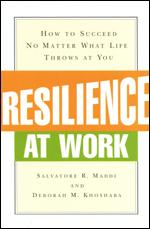Six months ago, I described the research around the fascinating topic of resilience. Since then, I have had the opportunity to witness, first hand, examples of people who are living out, daily, the characteristics of what the research tells us. It appears that we are headed out of the current economic crisis, but it won’t be the last time that we need to respond resiliently to stressful times. 
The research regarding resilience clearly describes “no middle ground” when it comes to peoples’ response to stressful situations. There are only two possible outcomes: (1) Either you’ll become stronger and more successful, OR (2) You’ll become weaker, less mentally healthy, and less likely to do great things in the future.
Which outcome best describes you and your response to stressful situations? The answer to this question depends on how you’re able to handle job-related stress, and whether you are capable of becoming a resilient person.
Management consultants Salvatore Maddi and Deborah Khoshaba conducted a 12-year study of the Illinois Bell Telephone (IBT) company staff, who were enduring almost constant organizational change during the deregulation changes in the telephone industry.
Every year for 12 years, 450 IBT employees (including supervisors, managers and executives) were interviewed, evaluated, given psychological tests, and given medical examinations. Everyone in the organization was feeling stress, and almost 50% of those sampled lost their jobs at some point during the study. The purpose of the study was to research how people under job-related stress handled these difficult conditions.
The research revealed that employees reacted to the stress in two distinct ways:
- 65% of the employees suffered additional serious stress-related events in their lives such as divorce, heart attacks, depression, anxiety, and drug/alcohol abuse.
- 35% of the employees actually thrived under the stress. Those who remained at IBT, rose to the top of the heap. Those who left either started companies of their own, or took strategically important employment in other companies.
When the data started to show a distinct difference between the two groups of employees, the researchers then attempted to quantify what caused a person to be part of the second group.
In their book, Resilience at Work, the researchers outlined their findings. A “resilient person” is someone who possesses and embraces the following: (1) commitment, (2) control, and (3) challenge.
“As times get tough, if you hold these attitudes, you’ll believe that it is best to stay involved with the people and events around you (commitment) rather than to pull out, to keep trying to influence the outcomes in which you are involved (control) rather than to give up, and to try to discover how you can grow through the stress (challenge) rather than to bemoan your fate.”
In short, a steadfast commitment allowed resilient employees to engage more fully in the job at hand (or with a new opportunity for those who lost their jobs). This helped them to understand and interpret the events that were having an impact on them.
Their sense of control empowered the resilient employees to consider ways that they could proactively influence the changes that were affecting them. Their less resilient colleagues tended to passively withdraw effort, believing there was little they could do to impact what they believed was their fate.
Lastly, the resilient employees interpreted the stressors and changes as a challenge, and tended to search out the potential opportunities that change would bring about. They took the outlook that change is an inevitable part of life. It didn’t mean that these people enjoyed the stress, but the positive outlook they embraced positioned them to keep an eye open for new opportunities.
On Wednesday, I’ll reveal the primary coping skills that separated the employees who grew, from those who languished as a result of the immense stress.
Editor’s Note: This article was written by Dr. David Mashburn. Dave is a Clinical and Consulting Psychologist, Partner at Tidemark, Inc. and a regular contributor to WorkPuzzle. Comments or questions are welcome. If you’re an email subscriber, reply to this WorkPuzzle email. If you read the blog directly from the web, you can click the “comments” link below.

